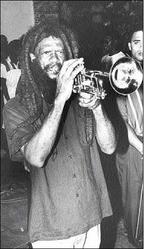HERBIE MILLER, Contributor

Johnny 'Dizzy' Moore. - File
AS A youth in Rockfort, I often observed Johnny 'Dizzy' Moore - the brethren with locks like a lion's mane, who wrapped his body in burlap sack while clutching a guava staff - as he trod the streets and frequented Rastafari camps in East Kingston.
Later, as a high school student, I witnessed his growth as a trumpeter with the Skatalites. He revealed himself a musician who dared to pursue creative authenticity and musical authority. With the disbanding of the Skatalites and the emergence of rock steady, Moore was among its leading musicians, performing on countless hit songs.
Though he contributed to the fundamental success that has made ska one of the most admired forms of Jamaican pop music, and rock steady the model for reggae, Moore was all but forgotten at the time of his death on August 16 at age 69.
Rastafari principles
At the height of the rock steady period, he immigrated to the United States where his musical ventures were secondary to providing for his family. He played his trumpet infrequently. He went back to growing his 'dreads', immersing himself in Rastafari principles. He also maintained a constant study of musical theory and assessed the socio-political decisions of developed countries and their impact on African diasporic communities.
Moore missed the first stage of reggae's popularity but when the Skatalites reunited in 1983 he also joined Bunny Wailer's band and in both groups he again displayed his fine musicianship. With age, and with the change of musical trends, Moore did not back down whenever tested by those who would seek to elevate themselves, musically, at the seemingly weary old lion's expense.
Emerging out of a tradition of outstanding Jamaican brass instrumentalists, Johnny 'Dizzy' Moore is regarded by many followers of Jamaican music as the most popular trumpeter of all. Certainly, he is among the most innovative. He is also one of the few older musicians able to reinvent himself; remaining vital to the form he helped establish, at the same time contributing to the currency of succeeding forms.
Synergy
This is so because Moore arrived on the music scene at a time when musicianship and Rastafari concepts coalesced. The synergy allowed for musical collaborations that signified the departure from established musical trends associated with North America, thus setting the foundation for a truly indigenous popular Jamaican music.
Because of his role in that innovation, Moore is recognised as a pioneer, the first phase of this development, and the foundation on which rock steady was structured and reggae, the island's most recognised popular music, created.
Popular music is, to date, the island's most enduring cultural product, and Moore has been a participant in all its major developments.
As a 1950s graduate of the famed Alpha Boys' School, Moore had as exemplifiers of brilliance, world-recognised Jamaican jazz trumpeters like Leslie Thompson, Oscar Clarke, Leslie 'Jiver' Hutchinson, Sonny Gray and Dizzy Reece. Amazingly, just as Moore was able to do, all these graduates of the Alpha music system established international reputations. What was also remarkable about Moore was that in his formative years he remained in Jamaica to create music rather than seek fame and fortune abroad.
Musically, Moore occupies a pivotal position among brass players in popular Jamaican music. Whether complementing the efforts of Skatalites members Don Drummond, Tommy McCook or Roland Alphonso, Moore's contributions have always been solid.
At times the quality of his music lifted a song above the seemingly simple or one-dimensional experience suggested by lesser talent. Moore brought a complex, deep logical slice of harmonic examination to ska. For example, his performance on any number of Drummond's tunes, or Black Sunday, Guns of Navarone, Well Charge and Caravan, by the Skatalites, are representations of the high standard of trumpet playing he was capable of.
An interpretation of the well known spiritual, Nobody Knows by The Wailers, shows just how balanced he navigated the thin line between sacred and secular.
Miles Davis
Like most trumpeters of his generation, Moore's earliest influence was Dizzy Gillespie but when the intensely cool and youthful Miles Davis made his move, he swayed to the introspective trumpeter's beckoning. Dizzy Johnny's lean lyrical impressionistic interpretations of a melody, and his explorative intent while he solos, are inspired by Davis', even as Moore established his own voice, style and musical persona, which is what the best musicians do.
But then, Dizzy Johnny keeps company with youth musicians. They are the majority in the band he calls the Jamaica All Stars, which each summer during school break, he, along with drummer and music teacher Winston 'Sparrow' Martin, assembles and goes off to Europe.
Still, for all the majesty, intelligence and wit that Moore has given to our music, he was essentially unrecognised. It never helped that he has always been modest about his musical prowess and achievements. Always one to understate his contributions, it is ironic that last year he was finally recognised with the Order of Distinction. Ironically, a power cut prevented and disappointed those of us waiting in anticipation in front of our television sets to see him receive his honour.
Great legacy
Along with a handful of others, including Count Ossie, Don Drummond, Tommy McCook, Roland Alphonso, Lloyd Knibb and Ernie Ranglin, Johnny Moore's role in music innovation has provided a great legacy that has informed every musician since the Skatalites.
Herbie Miller is a cultural historian with specialised interest in slave culture, Caribbean identity and Ethnomusicology. Copyright 2008 herbimill@aol.com.
Dizzy heights
Johnny Moore is credited as writer of the dancehall classic Rockfort Rock.
He played on The Wailers' 1964 hit song, Simmer Down.
Was best friend of troubled Skatalites trombonist Don Drummond.
Played on Love is Dangerous, a hit song in Japan in the mid-1990s for singer Yami Bolo.

